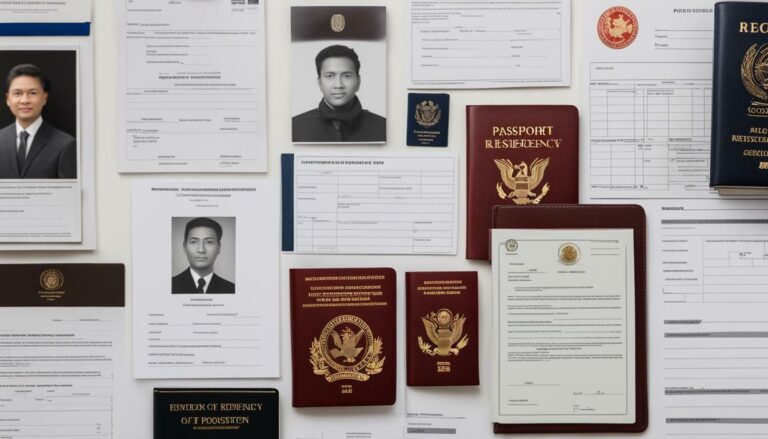Guide: How to Immigrate to New Zealand Under the Skilled Migrant Category
Immigrating to New Zealand under the Skilled Migrant Category can be a life-changing opportunity, but it’s essential to navigate the immigration requirements correctly. Understanding the process and meeting the necessary criteria are crucial for a successful visa application.
Key Takeaways:
- Applicants for the Skilled Migrant Category (SMC) visa go through two stages: Expression of Interest (EOI) and Residence Application.
- Points are claimed in the EOI stage for qualifications, work experience, age, and more, with a minimum score of 160 required for automatic selection.
- In the Residence Application stage, applicants submit their application and supporting documents to Immigration New Zealand for assessment against residence policy.
- Eligibility for the SMC visa requires claiming at least 6 points through various criteria like occupational registration, recognized qualification, or income.
- Processing times for the Skilled Migrant visa vary, but prioritized applications may take 4-7 weeks, while non-prioritized ones may take 2-18 months.
- Costs for the Skilled Migrant Category residence application range from NZD $4,020 to NZD $4,890, depending on the applicant’s location.
- If ineligible under the SMC, alternative pathways such as the Green List Occupation or Sector Agreement pathways may still be available.
- New Zealand Shores offers job search support and full eligibility assessments to help applicants meet the immigration requirements.
Understanding the Skilled Migrant Category (SMC) Visa
The Skilled Migrant Category (SMC) visa is designed to attract highly skilled individuals to New Zealand, and understanding the immigration points system and application process is crucial. The SMC visa application process consists of two stages: the Expression of Interest (EOI) and the Residence Application.
In the EOI stage, applicants are required to claim points based on various criteria, such as qualifications, work experience, and age. Expressions of Interest with a points score of 160 or more are automatically selected for further assessment. Immigration New Zealand then conducts a preliminary assessment to verify the information provided in the EOI.
If successful in the EOI stage, applicants proceed to the Residence Application stage. The application is submitted to Immigration New Zealand along with supporting documents. The application is assessed against the Government residence policy, which takes into consideration the applicant’s settlement potential and contribution to New Zealand. Depending on the assessment, applicants may be granted a Resident Visa, a Work Visa, or their application may be declined.
Immigration Points System
To be eligible for the SMC visa, applicants must claim at least 6 points through various criteria, such as occupational registration, recognized qualifications, or income. Points can also be claimed for skilled work experience in New Zealand. An applicant must have a job offer with an Accredited Employer and be paid at least the median wage or the market rate.
The processing time for the Skilled Migrant visa can vary. Prioritized applications may be processed within 4-7 weeks, while non-prioritized applications may take 2-18 months. If an applicant’s work visa expires during the residence application process, they will be granted a Skilled Migrant Category Interim Visa.
Cost and Alternatives
The cost of the Skilled Migrant Category residence application varies depending on the applicant’s location. Advertised fees range from NZD $4,020 to NZD $4,890. If an applicant is not eligible under the SMC visa, they may explore other options, such as the Green List Occupation or Sector Agreement pathways.
It is highly recommended to seek assistance from professionals like New Zealand Shores who offer job search support and provide full eligibility assessments to help applicants meet the requirements for the Skilled Migrant Category visa.
Qualifying Criteria for the Skilled Migrant Category Visa
To be eligible for the Skilled Migrant Category visa, applicants must meet specific criteria, including having skills in demand and meeting the residency requirements set by Immigration New Zealand. The qualifying criteria play a crucial role in determining an applicant’s eligibility for the visa.
Long-term Skill Shortage List
One of the key requirements is having skills that are in demand in New Zealand. To assess this, Immigration New Zealand maintains the Long-term Skill Shortage List, which identifies occupations facing a shortage of skilled workers in the country. If an applicant’s occupation is on this list, they are more likely to meet the skills requirement for the Skilled Migrant Category visa.
| Occupation | ANZSCO Code |
|---|---|
| Software Engineer | 261313 |
| Civil Engineer | 233211 |
| Registered Nurse | 254415 |
Table 1: Examples of occupations on the Long-term Skill Shortage List.
New Zealand Residency Requirements
In addition to meeting the skills requirement, applicants must also fulfill the residency requirements set by Immigration New Zealand. These requirements focus on an applicant’s intention to reside in New Zealand and their ability to contribute to the country’s economy and society. One of the key aspects is demonstrating a commitment to live in New Zealand for at least two years after obtaining the visa.
- Demonstrating strong ties to New Zealand, such as family connections or job offers;
- Having a plan to settle in New Zealand and contribute positively to the country;
- Showing proficiency in English language skills;
- Meeting health and character requirements.
List 1: Residency requirements for the Skilled Migrant Category visa.
By meeting the qualifying criteria, applicants increase their chances of successfully obtaining the Skilled Migrant Category visa and embarking on a new chapter in New Zealand.
Points-Based System and EOI Stage
The Skilled Migrant Category visa application uses a points-based system to determine eligibility, and during the EOI stage, applicants express their interest in migrating to New Zealand. Points are awarded based on various factors, including qualifications, work experience, age, and more. To be selected for further assessment, an Expression of Interest (EOI) must achieve a minimum of 160 points.
Immigration New Zealand conducts a preliminary assessment of the selected EOIs to verify the information provided. If successful in the EOI stage, applicants proceed to the Residence Application stage, where they submit their application along with supporting documents. The application is then assessed against government residence policy, taking into account settlement potential and contribution to New Zealand.
During the EOI stage, it is crucial for applicants to accurately claim points based on their qualifications, work experience, and other relevant criteria. Skilled work experience in New Zealand can also earn applicants additional points. However, to claim points for work experience, an applicant must have a job offer with an Accredited Employer and be paid at least the median wage or the market rate.
Points Claimable for Qualifications and Work Experience
In the Skilled Migrant Category visa application, applicants can claim points for their qualifications and work experience. Points are awarded based on the level of qualification achieved, with higher points awarded for higher-level qualifications. Additionally, work experience in a skilled occupation can also earn applicants valuable points.
| Qualification | Points |
|---|---|
| Recognized Level 3-6 qualification | 40 |
| Recognized Level 7 or 8 qualification | 50 |
| Recognized Level 9 or 10 qualification | 70 |
The table above showcases the points claimable for different levels of qualifications. It is important for applicants to provide accurate documentation and evidence of their qualifications to support their points claim.
“Qualifications play a vital role in the Skilled Migrant Category visa application. It’s essential to have recognized qualifications according to the New Zealand Qualifications Framework to maximize your points claim.”
Furthermore, work experience can also contribute to an applicant’s points claim. Points are awarded based on the duration and relevancy of the work experience. A minimum of two years of work experience is required to claim points in this category.
- Two years of relevant work experience: 10 points
- Four to six years of relevant work experience: 15 points
- Seven or more years of relevant work experience: 20 points
Claiming accurate points for qualifications and work experience is crucial for a successful Skilled Migrant Category visa application. It is recommended to seek the assistance of an Immigration Lawyer for New Zealand to ensure the accurate documentation and evidence are submitted to support the points claim.
Section 5: Residence Application and Assessment Process
Once an Expression of Interest is selected, applicants proceed to the residence application stage, where their application and supporting documents are assessed by Immigration New Zealand. This stage involves a detailed evaluation of the applicant’s eligibility for the Skilled Migrant Category visa, taking into consideration factors such as their qualifications, work experience, and ability to contribute to New Zealand society.
During the assessment process, Immigration New Zealand examines the applicant’s settlement potential, which includes their ability to integrate into the local community, their proficiency in English, and their understanding of New Zealand’s laws and values. This assessment aims to ensure that successful applicants will have a positive impact on the country and will be able to adapt to their new life in New Zealand.
It is important for applicants to provide accurate and complete documentation to support their residence application. This includes proof of qualifications, employment history, and any other relevant information that demonstrates their skills and experience. Immigration New Zealand may request additional documents or information if needed to make a thorough assessment of the application.
| Key Points: |
|---|
| Residence application is the second stage of the Skilled Migrant Category process. |
| Immigration New Zealand assesses the applicant’s eligibility and settlement potential. |
| Accurate and complete documentation is crucial to support the application. |
Once the residence application is submitted, applicants will receive an acknowledgment letter from Immigration New Zealand. The processing time for the application can vary based on a variety of factors, including the complexity of the case and the workload of the immigration department. While there is no fixed timeframe for the assessment, it is advisable for applicants to be patient and allow sufficient time for the process to be completed.
Throughout the application process, it is recommended to seek the guidance of an immigration lawyer specializing in New Zealand immigration. An experienced lawyer can provide valuable assistance, ensuring that all necessary documents are properly prepared and submitted, and that applicants meet the requirements set by Immigration New Zealand. By engaging the services of an immigration lawyer, applicants can enhance their chances of a successful outcome and reduce the risk of delays or complications in their application.
Residence Application and Assessment Process in Summary:
- Residence application is the second stage of the Skilled Migrant Category process.
- Immigration New Zealand assesses the applicant’s eligibility and settlement potential.
- Accurate and complete documentation is crucial to support the application.
- Processing times vary, and it is advisable to be patient throughout the process.
- An immigration lawyer can provide valuable guidance and assistance.
| Processing Time for Residence Application | |
|---|---|
| Prioritized Applications | Non-prioritized Applications |
| 4-7 weeks | 2-18 months |
Skilled Employment and Accredited Employers
Skilled employment is a crucial aspect of the Skilled Migrant Category (SMC) visa application, and securing a job offer from an Accredited Employer is beneficial. An Accredited Employer is recognized by Immigration New Zealand as meeting specific criteria, including a commitment to training and employing foreign workers. By having a job offer from an Accredited Employer, applicants can claim additional points in their SMC visa application.
When considering employment opportunities in New Zealand, it is important to research industries experiencing skill shortages. The occupation must be on the Long-term Skill Shortage List (LTSSL) or the Immediate Skill Shortage List (ISSL) to increase the chances of finding skilled employment. Having a recognized qualification or relevant work experience in one of these shortage areas increases the likelihood of finding suitable employment.
It is also essential to meet the income requirement for skilled employment to claim points in the SMC visa application. The salary offered must be at least the median wage or the market rate for the specific occupation. By meeting this requirement, applicants demonstrate their value and contribution to the New Zealand labor market.
| Requirements for Skilled Employment | Points |
|---|---|
| Job offer from an Accredited Employer | 50 |
| Job offer in an occupation on the LTSSL | 50 |
| Job offer in an occupation on the ISSL | 30 |
| Job offer in any other occupation | 20 |
Securing skilled employment in New Zealand and having an Accredited Employer’s job offer not only increases the chances of a successful SMC visa application but also provides an opportunity for individuals to contribute their expertise to the country’s workforce. Seeking the assistance of an immigration lawyer for New Zealand can facilitate the process, ensuring all necessary steps are taken to maximize the chances of a successful outcome.
Points Claimable for Qualifications and Work Experience
Qualifications and work experience are key factors in the points-based system, and understanding how to claim points for these can enhance an applicant’s chances of success.
When it comes to qualifications, points can be claimed for having a recognized qualification or a qualification in an area of absolute skills shortage. The New Zealand Qualifications Authority (NZQA) assesses overseas qualifications to determine their equivalence in New Zealand.
Work experience is also an important aspect of the Skilled Migrant Category visa application. Points can be claimed for skilled work experience in New Zealand, overseas work experience, and work experience in identified future growth areas. It’s important to provide evidence of the work experience, such as employment contracts, reference letters, and payslips, to support the claim for points.
| Qualifications | Points |
|---|---|
| Recognized Qualification | 50 |
| Qualification in an Area of Absolute Skills Shortage | 50 |
“Work experience is an invaluable asset in the Skilled Migrant Category visa application. It not only demonstrates your expertise in a particular field but also shows your adaptability and potential to contribute to the New Zealand workforce.”
- Skilled Work Experience in New Zealand: Points depend on the length of the employment, ranging from 10 to 50 points.
- Overseas Work Experience: Points range from 10 to 30, depending on the number of years of experience.
- Work Experience in Identified Future Growth Areas: Points range from 10 to 30, depending on the number of years of experience.
Beyond qualifications and work experience, other factors such as age, English language proficiency, and job offers from accredited employers also contribute to an applicant’s points total. It’s essential to understand the points system and how each criterion can impact the overall score. Consulting with an immigration lawyer for New Zealand can provide valuable guidance and enhance the chances of a successful Skilled Migrant Category visa application.
Processing Time and Skilled Migrant Category Interim Visa
The processing time for a Skilled Migrant Category visa application can vary, and applicants should be aware of the Skilled Migrant Category Interim Visa if their work visa expires during the application process.
Priority is given to certain applications, which could result in a faster processing time of around 4-7 weeks. However, non-prioritized applications may take anywhere from 2 to 18 months to be processed. It’s important to note that these timeframes are estimates and can vary depending on factors such as the complexity of the application, the completeness of supporting documentation, and the volume of applications being processed at the time.
If an applicant’s work visa is due to expire while their Skilled Migrant Category residence application is still being processed, they will be granted a Skilled Migrant Category Interim Visa. This interim visa allows individuals to continue living and working in New Zealand until a decision is made on their residence application.
| Processing Time | Visa Type | Validity Period |
|---|---|---|
| 4-7 weeks | Priority Applications | N/A |
| 2-18 months | Non-Prioritized Applications | N/A |
| N/A | Skilled Migrant Category Interim Visa | Until a decision on the residence application is made |
It’s essential for applicants to plan accordingly and be prepared for possible delays in the processing of their Skilled Migrant Category visa application. Keeping track of their visa expiration date and understanding the Skilled Migrant Category Interim Visa process will help ensure a smooth transition during the immigration process.
Cost of the Skilled Migrant Category Residence Application
The cost of a Skilled Migrant Category residence application depends on the applicant’s location and can range from NZD $4,020 to NZD $4,890. It is important to note that these fees are subject to change, and applicants should check the official Immigration New Zealand website for the most up-to-date information.
Fee Variations:
| Location | Fee |
|---|---|
| New Zealand | NZD $4,020 |
| Australia or the Pacific | NZD $4,720 |
| Rest of the world | NZD $4,890 |
These fees cover the cost of processing the residence application and are payable upon submission. It is recommended to consult with an immigration lawyer or advisor to ensure all requirements are met and the application is prepared correctly to avoid any delays or additional costs.
Applicants should also note that there may be additional costs associated with the Skilled Migrant Category application process, such as medical examinations, police certificates, and translation services. These costs are not included in the application fee and should be budgeted for accordingly.
It is essential to carefully consider the cost implications of the Skilled Migrant Category residence application and to consult with a qualified immigration professional who can guide applicants through the process and help them understand the overall expenses involved in immigrating to New Zealand.
Green List Occupation and Sector Agreement Pathways
If an applicant does not meet the eligibility criteria for the Skilled Migrant Category visa, they may still have options through the Green List Occupation or Sector Agreement pathways.
The Green List Occupation pathway allows individuals with specific skills and qualifications to apply for a work visa in New Zealand. This pathway is designed to meet the demand for certain occupations and encourages individuals with expertise in those fields to contribute to the country’s workforce.
The Sector Agreement pathway, on the other hand, provides opportunities for individuals who possess specialized skills that are in high demand in specific sectors or industries. Under this pathway, agreements are made between the New Zealand government and certain sectors, allowing employers in those sectors to hire workers from overseas to fill skill shortages.
Both pathways offer alternative routes for individuals who may not qualify under the Skilled Migrant Category visa. It is important to consult with an immigration lawyer for New Zealand to fully understand the requirements and options available under these pathways.
| Pathway | Requirements | Benefits |
|---|---|---|
| Green List Occupation | – Specific skills and qualifications – Job offer in a green list occupation |
– Work visa in New Zealand – Opportunity to contribute to the workforce |
| Sector Agreement | – Specialized skills in high-demand sectors – Job offer in a sector covered by an agreement |
– Work visa in specific sectors – Fill skill shortages in those sectors |
Job Search Support and Eligibility Assessment
New Zealand Shores offers valuable job search support and comprehensive eligibility assessments to help applicants navigate the immigration requirements effectively. Whether you are applying under the Skilled Migrant Category (SMC) or exploring alternative pathways, their services can greatly enhance your chances of success.
With extensive knowledge of the New Zealand job market, the team at New Zealand Shores can assist you in finding suitable employment opportunities that align with your skills and qualifications. They understand the importance of securing a job offer from an Accredited Employer and can guide you through the process of negotiating contracts and ensuring that you meet the necessary criteria.
In addition to job search support, New Zealand Shores provides comprehensive eligibility assessments to determine your suitability for various immigration pathways. Their experienced immigration lawyers will thoroughly evaluate your qualifications, work experience, and other relevant factors to identify the best route for you. This personalized assessment will give you a clear understanding of your options and help you make informed decisions about your immigration journey.
By availing yourself of New Zealand Shores’ job search support and eligibility assessment services, you can maximize your chances of successfully navigating the New Zealand immigration requirements. Let their expertise and guidance pave the way for a smooth and successful transition to your new life in New Zealand.
| Services Offered | Benefits |
|---|---|
| Job Search Support | – Access to the New Zealand job market – Assistance in finding suitable employment opportunities – Guidance in negotiating contracts – Compliance with Accredited Employer requirements |
| Eligibility Assessment | – Thorough evaluation of qualifications and work experience – Identification of the best immigration pathway – Clear understanding of options and requirements – Informed decision-making |
Conclusion
Immigrating to New Zealand under the Skilled Migrant Category is an exciting opportunity, but it requires a thorough understanding of the immigration requirements to ensure a successful application. The Skilled Migrant Category (SMC) visa is divided into two stages: the Expression of Interest (EOI) and the Residence Application. In the EOI stage, applicants claim points for various criteria, and those with a score of 160 or more are selected for further assessment. If successful, applicants proceed to the Residence Application stage, where their application is assessed against Government residence policy.
To be eligible for the SMC visa, applicants must claim at least 6 points through criteria such as occupational registration, recognized qualification, or income. Skilled work experience in New Zealand can also earn points, requiring a job offer from an Accredited Employer. The processing time for the Skilled Migrant Category visa varies, and applicants may be granted a Skilled Migrant Category Interim Visa if their work visa expires during the application process.
The cost of the Skilled Migrant Category residence application ranges from NZD $4,020 to NZD $4,890, depending on the applicant’s location. However, if an applicant is not eligible under the SMC, alternative pathways such as the Green List Occupation or Sector Agreement pathways may be explored. New Zealand Shores offers valuable job search support and full eligibility assessments to assist applicants in meeting the immigration requirements for the Skilled Migrant Category visa.
It’s important to approach the Skilled Migrant Category visa application with a comprehensive understanding of the process and requirements. By staying informed and seeking expert guidance, individuals can maximize their chances of successfully immigrating to New Zealand under the Skilled Migrant Category and embarking on an exciting new chapter in their lives.
FAQ
Q: What is the Skilled Migrant Category (SMC) visa?
A: The Skilled Migrant Category (SMC) visa is a pathway to obtain a New Zealand residence visa for skilled individuals.
Q: How does the Skilled Migrant Category visa application process work?
A: The Skilled Migrant Category visa application process consists of two stages: the Expression of Interest (EOI) stage and the Residence Application stage.
Q: What is the qualifying criteria for the Skilled Migrant Category visa?
A: To be eligible for the Skilled Migrant Category visa, applicants must meet certain criteria, including claiming at least 6 points through various factors such as occupational registration, recognized qualification, or income.
Q: How does the points-based system and EOI stage work?
A: The points-based system is used to determine the eligibility of applicants. In the EOI stage, applicants claim points for qualifications, work experience, age, etc. Expressions of Interest with a points score of 160 or more are automatically selected.
Q: How does the residence application and assessment process work?
A: After successful selection in the EOI stage, applicants proceed to the Residence Application stage. The application is assessed against Government residence policy, considering settlement potential and contribution to New Zealand.
Q: What is the role of skilled employment and accredited employers in the Skilled Migrant Category visa application?
A: Skilled employment is an important factor in the Skilled Migrant Category visa application. Applicants must have a job offer with an Accredited Employer and be paid at least the median wage or the market rate.
Q: Can points be claimed for qualifications and work experience?
A: Yes, points can be claimed for qualifications and work experience in the Skilled Migrant Category visa application.
Q: How long does the Skilled Migrant Category visa processing time take?
A: The processing time for the Skilled Migrant Category visa varies. Prioritized applications may take 4-7 weeks, while non-prioritized applications may take 2-18 months.
Q: What is the cost of the Skilled Migrant Category residence application?
A: The cost of the Skilled Migrant Category residence application varies depending on the applicant’s location. The advertised fees range from NZD $4,020 to NZD $4,890.
Q: What are the Green List Occupation and Sector Agreement pathways?
A: The Green List Occupation and Sector Agreement pathways are alternative pathways to immigrate to New Zealand if an applicant is not eligible under the Skilled Migrant Category visa.
Q: Does New Zealand Shores offer job search support and eligibility assessment?
A: Yes, New Zealand Shores offers job search support and provides a full eligibility assessment to help applicants meet the requirements of the Skilled Migrant Category visa.
Source Links
- https://www.new-zealand-immigration.com/visa/skilled-migrant-residence-pathway
- https://www.new-zealand-immigration.com/visa/the-points-guide
- https://www.newzealandshores.com/residence-via-employment/skilled-migrant-category-resident-visa/







